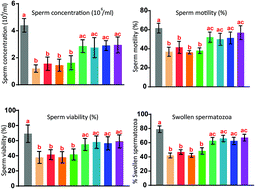Dietary intake of probiotic fermented milk benefits the gut and reproductive health in mice fed with an obesogenic diet†
Abstract
Probiotics have been suggested as alternatives to pharmacological drugs in the treatment of a variety of medical problems, including obesity management, which is often linked to low sperm production. Also, probiotic fermented products are known to boost host immune response, immunosenescence, infection tolerance, and redox homeostasis, but their direct role in male fertility has been less investigated. This study assessed the effect of two probiotic strains, L. fermentum NCDC 400 and L. rhamnosus NCDC 610, and fructooligosaccharide (FOS) fermented milk supplementation. We identified the significantly reduced oxidative stress markers in the plasma and liver of HF diet-fed animals. We determined the role of key testicular enzymes of steroidogenic pathway genes StAR, P450scc, and 17βHSD in maintaining the testosterone concentration and restoring testicular structures. In conclusion, the present work illustrated the ability of both probiotics L. fermentum NCDC 400 and L. rhamnosus NCDC 610 as regulatory agents with beneficial effects on weight loss and endogenous testosterone with substantially improved sperm motility in male diet-induced obesity (DIO) models. Our findings indicate that fermented milk supplementation may be an alternative treatment for preventing obesity and other related metabolic syndromes.



 Please wait while we load your content...
Please wait while we load your content...